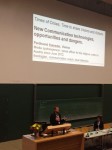 The speech on Monday, 30th of July 2012 at the University of Vienna (Pax Romana Vienna):
The speech on Monday, 30th of July 2012 at the University of Vienna (Pax Romana Vienna):
Ladies and Gentlemen,
it is my great honour to share my experiences in the field of social media here. I’m sorry, but my English is not fluent. I’ll give it a try.
I am not a digital native. At school I learned Latin and Ancient Greek, I studied theology. I took courses in social ethics, economy and politics at the Catholic Social Academy in Vienna. Professionally, I was a pastoral worker for 10 years at the cathedral of Linz in Austria. Then I supported students of theology in planning their career for a religious occupation for 10 years. In 1997 I was appointed the Internet/Web Officer of the Diocese of Linz. It was an new term. This was an intensive introduction to the digital world. Others say that I am an early adaptor. Wonderful and very competent colleagues have introduced me into this world. It was always important to me that digital possibilities in technology do not become independent but remain an integrative part of the church organization, the diocese, the parish and educational institutions.
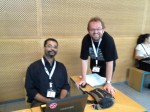 As of 2000 I built up the communications office for the Diocese of Linz. The Internet and the new media were the catalyst for those in charge to establish a professional platform. Large organizational units had to be made ready for the Internet. We could hardly follow the technical developments. E-mail communication and the presentation of various types of content on the respective websites have endured to this day.
As of 2000 I built up the communications office for the Diocese of Linz. The Internet and the new media were the catalyst for those in charge to establish a professional platform. Large organizational units had to be made ready for the Internet. We could hardly follow the technical developments. E-mail communication and the presentation of various types of content on the respective websites have endured to this day.
Internet, driving a car or airplanes?
Social media is the new digital reality. I would like to briefly discuss chances and risks. Only fragmentary. This new digital world, this new digital space, this new digital reality has become so widespread that I could equally talk about driving a car or the airplane industry.
I will highlight some aspects from my personal experience. I have blogged for years. Since 2008 I use Twitter. On Facebook I have 1.400 friends, whom I all know personally or have some kind of personal connection to. I’m still experimenting with Google+. I have uploaded a couple of videos on YouTube knowing that they are unprofessional. People still watch them. Xing is my professional companion because I have changed my job three times since 2009. One year I worked in the think tank for future studies and the digital world was the main means of communication. My blog about walking over 1.400 kilometres from Linz to Assisi in 52 days was followed by 1.500 users every day. This was 2009.
This leads me to my first point:
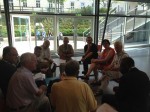 Social media is not a question of technique but a question of the person, the actual human being. And just imagine: I enjoy it all and claim that I am quite normal because social media are the most normal thing in the world with all it opportunities, bright sides, risks and hazards.
Social media is not a question of technique but a question of the person, the actual human being. And just imagine: I enjoy it all and claim that I am quite normal because social media are the most normal thing in the world with all it opportunities, bright sides, risks and hazards.
This leads me to the second point and concern.
In the many talks I have given here in Austria I always try to use an image how this digital world is ticking. This is based on the experience that this new world does not work differently from the analogue world. It’s no different than the real world. It is only new, uncommon and a great learning environment. Young people have got a networking platform here where they travel faster than old people! They play this joker every day and enjoy the lead.
I always invite people, to envision these digital worlds as a new kind of pub or shopping centre. Some say: I never got there and others can’t wait until the doors open or until a new product has arrived.
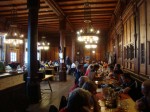 Social media are the digital pub.
Social media are the digital pub.
Here, private matters are taken into the public sphere. I decide with whom I sit down. I decide when I’m there and what kind of information about myself I give away. Institutions have their place rather on posters near the entrance or exit and not so much on the table. Here, people are in demand. No professor will come up with the idea to give lectures at a pub table. This is where he or she recounts what they are experiencing all around their lectures. Also the pastor will not preach his sermon again in the pub because he meets some people there who do not go to church. He will listen and maybe share one or another thought from his pastoral experience. What one shares on Facebook is almost exclusively personal information, texts, images, videos, things you value or what is going on. Entertainment. I myself have never played. Others do so excessively– similar to the pub.
So it’s like real life and everything works just the same. Here is another example: If an 8-year-old shows up alone in a pub every day he will soon be asked: Who are your parents? Pub and Facebook are not right for an 8-year-old.
Therefore: no fear and no great expectations – the digital communities show a person as he or she really is – neither better nor worse.This I would note down as a third point.
This leads to the fourth point right away.
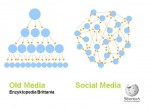 Who considers himself or herself a catholic will be aware of the structural change. Today’s Roman Catholic Church puts hierarchical forms in the foreground – against the majority of its members. The synodal constitution of the Church, as it was rediscovered during the Second Vatican Council and is still practiced in religious orders today, moves into the background.
Who considers himself or herself a catholic will be aware of the structural change. Today’s Roman Catholic Church puts hierarchical forms in the foreground – against the majority of its members. The synodal constitution of the Church, as it was rediscovered during the Second Vatican Council and is still practiced in religious orders today, moves into the background.
The Old Media are hierachical. The New Media.are synodal. Rome is old and they have fear, that a new church is growing up in the new media.
What is the consequence?
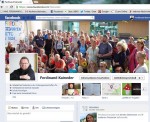 I gave a speech at a fashion school in Ebensee in Upper Austria in front of all pupils and teachers. The pupils – aged between 15 and 19 years – were all on Facebook. The teachers were divided. One third was on Facebook, one third had seen it before and doesn’t use it, one third strongly opposes Facebook and fights using it during school hours. They are afraid that information is distributed about the school that they cannot control. Afterwards, in the staff room, I could convince most of them: students are interested in presenting “their” school in a positive light internationally. This increases their prospect of a career and their image and standing. So: let the students represent the school on Facebook!
I gave a speech at a fashion school in Ebensee in Upper Austria in front of all pupils and teachers. The pupils – aged between 15 and 19 years – were all on Facebook. The teachers were divided. One third was on Facebook, one third had seen it before and doesn’t use it, one third strongly opposes Facebook and fights using it during school hours. They are afraid that information is distributed about the school that they cannot control. Afterwards, in the staff room, I could convince most of them: students are interested in presenting “their” school in a positive light internationally. This increases their prospect of a career and their image and standing. So: let the students represent the school on Facebook!
Responsibility
I always have to take responsibility for my actions. There are no excuses. I control my actions. Here, some are ethically and practically overburdened. One problem I see is the fact that we are mostly living in an irresponsible society. The mathematician Rudolf Taschner said that the church should really only do one thing: remind a person every day that he or she lives in responsibility.
I myself always say: A sentence ends with a full stop. To think and act sustainably is the basic for the positive use of social media and the presence in a pub. Stupidities are spread analogue and digitally.
This leads to the next consequence:
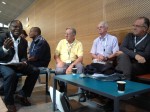 The single person has to discover and sharpen his or her conscience. This is not easy considering the circumstances like monetarism, openly practiced greed, corruption played down as trivial offence or PR-gags that often want to put the individual back on track. Advertising and emotionally charged images from the world of capital economy “format” the people, especially young people between 13 and 17 ages, as the neuroscientist professor Singer confirms.
The single person has to discover and sharpen his or her conscience. This is not easy considering the circumstances like monetarism, openly practiced greed, corruption played down as trivial offence or PR-gags that often want to put the individual back on track. Advertising and emotionally charged images from the world of capital economy “format” the people, especially young people between 13 and 17 ages, as the neuroscientist professor Singer confirms.
And yet we confirm: self-responsibility and individuality are the challenge or the personal overload. Thank God, the individuality of the human is in his or her sociality. As Christians today we have chosen the support of the community ourselves and freely.
What are the dangers I see in practice?
 • Social media are time killers number one.
• Social media are time killers number one.
• Digital is cold and there is a risk of an emotional chill
• Everything appears without priorities and who helps to sort things out?
• Numbers in the sense of a binary code become the benchmark for everything. The number of clicks determines good and bad. This is especially true for YouTube.
• Systems become square and always more closed. This is a real limit in the future of Facebook, the isolation and seclusion.
• Nature and its haptic quality is entirely blended out.
• What happens to my data? We don’t know.
• The new dynamics of smartphones is the real evolution or revolution. There will be some of you present here, who, while I’m talking, may communicate themselves on the side and without attracting attention. Divided attention is a hazard. Multi-tasking is no longer in. To be here – undivided – and not spreaded in the hole world in Social Media.
What are the opportunities in concrete terms?
 • Content is user generated and there is meaning in that.
• Content is user generated and there is meaning in that.
• New sympathies and networking is possible more readily.
• Communication is accessible and cheap, across continents, almost limitless
• I see speed as an opportunity. Who shouts out first sets the agenda, decides on the topic and the enduring image.
• Being able to compare and share ideas and experiences
• Rigid structures can be broken open
• The system itself knows about self-censorship based on a set of rules or an ethos of human rights.
• It is minority friendly
• I associate emotions, beliefs, estimations, a certain kind of lightness of life with those digital pubs and meeting rooms
How to deal with it?
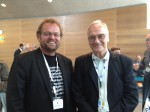 See everything as normal and learn to live with surprises
See everything as normal and learn to live with surprises
See risks and chances similar to driving a car or climbing a mountain.
Talk about this “new world” in the analogue world. Drinking a beer together or meeting at a “Heuriger” cannot be replaced by anything.
What are people looking for?
Appreciation – meaningful work – solidarity / community in the sense of a self-determined community.
I friend those people who support me in this, who deal with this respectfully, who DO interesting things and with whom I feel comfortable.
And all over again: Standing back and integrating distance.
I always ask myself: Can I distance myself? – from Mobile Device or the Laptop.
 Everyone has to find their own way. So it’s not the technology that is responsible for opportunities and dangers but the single person in his or her application.
Everyone has to find their own way. So it’s not the technology that is responsible for opportunities and dangers but the single person in his or her application.
It’s not a technical question.
It’s you and me!
Thank you for your attention!
Ferdinand Kaineder, Vienna Media spokesperson / press officer for the religious orders in Austria since June 2012,
theologian, communication coach, local detective

 Das Anpacken-Buch
Das Anpacken-Buch
1 Kommentar
Es wäre schön, wenn wenigstens einige Priester diese Rede (möglichst in deutsch) lesen könnten und genau so aufgeschlossen allem Neuen wären und sich damit auseinandersetzen würden.